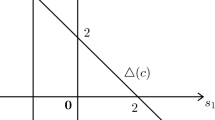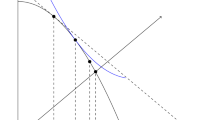Abstract
This paper introduces and analyzes the class of inequality averse multi-utilitarian solutions for cooperative bargaining problems. We show that generalized Gini solutions and inequality averse Choquet solutions are particular cases of this new multi-valued solution concept and provide a complete characterization in which an invariance property, consisting of a weakening of both the linear invariance axiom in Blackorby et al. (Econometrica 62:1161–1178, 1994) and the restricted invariance axiom in Ok and Zhou (Games Econ Behav 33:249–264, 2000), plays an important role. Moreover, by relaxing the assumptions involved in the characterization, the class is extended to include inequality loving multi-utilitarian solutions which are also studied in the paper.
Similar content being viewed by others
References
Arrow K (1959) Rational choice functions and orderings. Econometrica 26: 121–127
Blackorby C, Bossert W, Donaldson D (1994) Generalized Ginis and cooperative bargaining solutions. Econometrica 62: 1161–1178
Curiel I (1997) Cooperative game theory and applications. Kluwer, Dordrecht
Kalai E (1977) Proportional solutions in bargaining situations: interpersonal utility comparison. Econometrica 45: 1623–1630
Myerson RB (1977) Two-person bargaining problems and comparable utility. Econometrica 45: 1631–1637
Nash JF (1950) The bargaining problem. Econometrica 18: 155–162
Ok EA, Zhou L (1999) Revealed group preferences on non-convex choice problems. Econ Theory 13: 671–687
Ok EA, Zhou L (2000) The Choquet bargaining solution. Games Econ Behav 33: 249–264
Schmeidler D (1986) Integral representation without additivity. Proc Am Math Soc 97: 253–261
Shubik M (1982) Game theory in the social sciences. MIT Press, Cambridge
Weber RJ (1988) Probabilistic values of games. In: Roth AE (eds) The shapley value. Cambridge University Press, Cambridge, pp 101–119
Author information
Authors and Affiliations
Corresponding author
Rights and permissions
About this article
Cite this article
Hinojosa, M.A., Mármol, A.M. & Zarzuelo, J.M. Inequality averse multi-utilitarian bargaining solutions. Int J Game Theory 37, 597–618 (2008). https://doi.org/10.1007/s00182-008-0137-2
Accepted:
Published:
Issue Date:
DOI: https://doi.org/10.1007/s00182-008-0137-2




